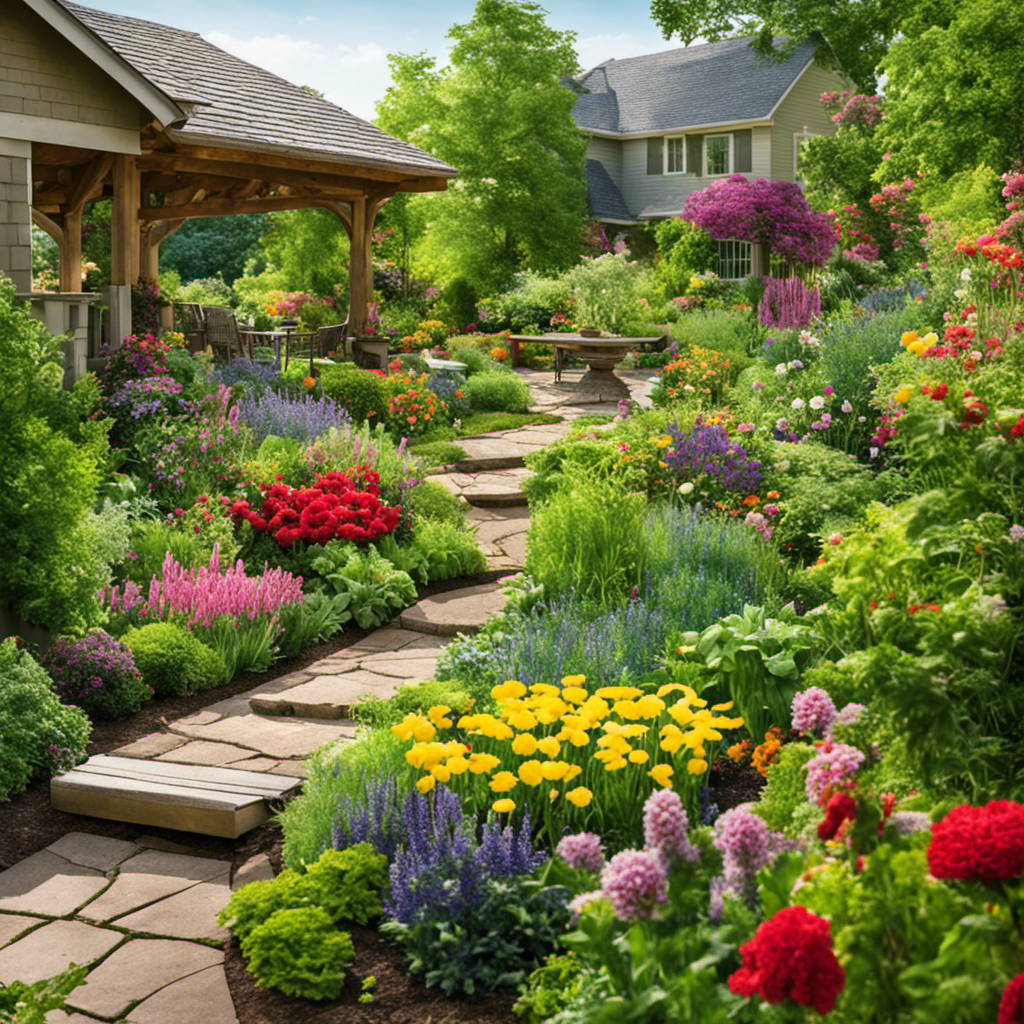As a nature lover, I’ve always believed that our gardens can be more than just a patch of green. They can be havens of sustainability and richness, teeming with life and vibrant colors.
In this article, I’ll share practical tips and organic practices for creating a sustainable backyard. From composting to natural pest control, water conservation, and choosing native plants, we’ll explore how small changes can make a big impact on our environment.
Let’s dive into the world of green gardening and cultivate a thriving ecosystem right outside our doors.
Key Takeaways
- Organic gardening improves soil health and plant health while reducing chemical exposure and protecting the environment.
- Implementing composting in your backyard can enrich the soil, reduce waste, and save money on fertilizers.
- Natural pest control methods, such as attracting beneficial insects and practicing companion planting, can help maintain a healthy garden without harmful pesticides.
- Water conservation techniques, like using mulch and rainwater harvesting, promote sustainable gardening by minimizing water wastage.
The Benefits of Organic Gardening
I’ve noticed that organic gardening has numerous benefits for both my backyard and the environment. One of the major advantages is the enrichment of soil health. By using organic methods, such as composting, mulching, and crop rotation, I’m able to improve the fertility and structure of my soil. This results in healthier plants with stronger root systems, better nutrient absorption, and increased resistance to pests and diseases.
Organic gardening also allows me to reduce chemical exposure in my backyard. Unlike conventional gardening, which relies heavily on synthetic fertilizers and pesticides, organic practices emphasize natural alternatives. For instance, I can use organic compost and manure to provide essential nutrients to my plants, instead of relying on chemical fertilizers. Additionally, I can control pests and diseases through biological means, such as introducing beneficial insects or using homemade organic sprays.
By choosing organic gardening methods, I’m not only creating a safer and healthier environment for myself and my family, but also contributing to the overall well-being of the planet. Chemical fertilizers and pesticides used in conventional gardening can leach into groundwater, pollute rivers and streams, and harm beneficial organisms. Organic gardening, on the other hand, promotes biodiversity and helps maintain a balance in ecosystems.
Implementing Composting in Your Backyard
Composting is a great way to enrich the soil and reduce waste in my yard. Backyard composting is a simple and effective technique that allows me to turn kitchen scraps, yard trimmings, and other organic materials into nutrient-rich compost. To begin backyard composting, I first need to designate a composting area in my yard. It can be a small bin, a pile, or even a compost tumbler.
The next step is to add a mix of ‘green’ and ‘brown’ materials. Green materials include fruit and vegetable scraps, coffee grounds, and grass clippings, while brown materials consist of dried leaves, twigs, and shredded newspaper. It’s important to maintain the right balance between these materials to ensure proper decomposition.
I’ll need to turn the compost regularly to help with aeration and decomposition. In a few months to a year, I’ll have dark, crumbly compost that can be used to enrich the soil in my garden beds. By incorporating backyard composting into my gardening routine, I can reduce waste, save money on fertilizers, and promote healthy plant growth.
Transitioning into the next section about natural pest control methods, it’s important to note that a healthy garden not only relies on nutrient-rich soil but also on effective pest management strategies.
Natural Pest Control Methods for a Healthy Garden
Transitioning into the topic of natural pest control, I’ve found that implementing these methods in my garden has been crucial for maintaining a healthy and thriving environment for my plants. Instead of relying on harmful pesticides, I’ve discovered environmentally friendly alternatives that effectively keep pests at bay while protecting the ecosystem.
One of the most effective natural pest control methods I’ve used is attracting beneficial insects. These insects, such as ladybugs and lacewings, feed on common garden pests like aphids and caterpillars. To attract them, I’ve planted flowers like marigolds, daisies, and yarrow, which provide nectar and pollen for these beneficial insects. Additionally, I’ve created habitats like bug hotels and birdhouses to encourage their presence in my garden.
Another method I’ve found helpful is companion planting. By intermingling certain plants, I can repel pests naturally. For example, planting garlic or chives near roses can deter aphids, while planting basil near tomatoes can deter whiteflies. The scents and chemical compounds released by these companion plants act as natural repellents.
Water Conservation Techniques for Sustainable Gardening
To save water and promote sustainability in my garden, I prioritize using mulch to retain moisture and reduce evaporation. However, there are other water conservation techniques that can further enhance the eco-friendliness of my gardening practices.
One such technique is rainwater harvesting, which involves collecting and storing rainwater for later use in the garden. By installing rain barrels or cisterns, I can capture rainwater runoff from rooftops and direct it into storage containers. This harvested water can then be used for watering my plants, reducing the need for tap water and conserving this precious resource.
Another water-saving technique I employ is drip irrigation. This method delivers water directly to the plant’s root zone, minimizing wastage through evaporation or runoff. Drip irrigation systems consist of tubes or pipes that have small holes or emitters, allowing water to slowly drip onto the soil. This targeted approach ensures that water is delivered precisely where it’s needed, preventing water loss and maximizing efficiency.
By implementing rainwater harvesting and drip irrigation in my garden, I can significantly reduce water consumption and contribute to a more sustainable environment. These techniques not only conserve water but also help maintain healthy soil moisture levels and promote plant growth.
With these water conservation measures in place, I can now turn my attention to choosing native plants for a thriving backyard ecosystem.
Choosing Native Plants for a Thriving Backyard Ecosystem
Incorporating native plants into my garden not only supports a thriving backyard ecosystem but also ensures the health and vitality of the surrounding environment. Native plants are well-adapted to the local climate and soil conditions, making them resilient and low-maintenance. By planting native species, I’m helping to preserve biodiversity and create a habitat that attracts pollinators and other beneficial wildlife.
Here are four reasons why incorporating native plants is beneficial:
-
Attracting pollinators with native plants: Native plants provide essential food and shelter for pollinators such as bees, butterflies, and hummingbirds. Their flowers provide nectar and pollen, while their foliage offers a habitat for caterpillars, which eventually turn into butterflies.
-
Creating a wildlife-friendly backyard: Native plants support a diverse range of wildlife, including birds, insects, and small mammals. They provide food sources, nesting sites, and protective cover, creating a balanced ecosystem that encourages biodiversity.
-
Conserving water: Native plants are adapted to local rainfall patterns, reducing the need for supplemental watering. Their deep root systems help prevent soil erosion and improve water infiltration, making them ideal for water conservation in the garden.
-
Reducing the use of pesticides and fertilizers: Native plants have developed natural defenses against pests and diseases, reducing the need for chemical interventions. They also require minimal fertilization, as they’ve evolved to thrive in the local soil conditions.
Frequently Asked Questions
What Are Some Common Mistakes to Avoid When Starting an Organic Garden?
When starting an organic garden, it’s important to avoid common mistakes that can hinder your success.
One of these mistakes is neglecting to maintain soil fertility. Organic gardening relies on healthy soil, so regularly adding organic matter, like compost, is essential.
Another mistake to avoid is using synthetic fertilizers or pesticides, as this goes against the principles of organic gardening. Instead, focus on natural pest control methods and nurturing a balanced ecosystem in your backyard.
How Can I Effectively Prevent Weeds From Overtaking My Organic Garden?
To effectively prevent weeds from overtaking my organic garden, I rely on two key techniques: companion planting and mulching.
Companion planting involves strategically placing plants together that naturally deter weeds, such as marigolds or garlic.
Mulching, on the other hand, helps suppress weeds by creating a barrier between the soil and sunlight.
What Are Some Alternatives to Chemical Fertilizers That Can Be Used in Organic Gardening?
When it comes to organic gardening, there are several alternatives to chemical fertilizers that can help nourish and enrich your soil.
Natural soil amendments, such as compost made from kitchen scraps and yard waste, are a great option. Homemade compost is rich in nutrients and can improve soil structure and fertility.
It’s a sustainable and cost-effective way to provide your plants with the necessary nutrients they need to thrive.
Are There Any Specific Types of Plants That Are More Resistant to Pests and Diseases?
There are certain types of plants that are more resistant to pests and diseases. Disease-resistant plants have built-in mechanisms that make them less susceptible to common plant diseases. Some examples of disease-resistant plants include tomatoes, beans, and cucumbers.
On the other hand, pest-resistant plants have natural defenses that deter or repel pests. Plants like marigolds, lavender, and garlic are known for their pest-resistant properties.
How Can I Attract Beneficial Insects to My Garden Without Using Harmful Pesticides?
To attract beneficial insects and promote natural pest control in my garden, I’ve found a few effective strategies.
First, I plant a diverse range of flowers and herbs that attract pollinators and predatory insects.
Second, I provide a water source like a birdbath or shallow dish with rocks for insects to drink from.
Conclusion
In the journey towards a sustainable backyard, organic gardening and mindful practices are a beacon of hope. Like a delicate seedling breaking through the soil, these methods offer a path towards harmony with nature.
By embracing composting, natural pest control, water conservation, and native plants, we can nurture a thriving backyard ecosystem.
Let’s be the caretakers of our little piece of earth, tending to it with love and respect, and watch as it blossoms into a haven for all creatures great and small.





